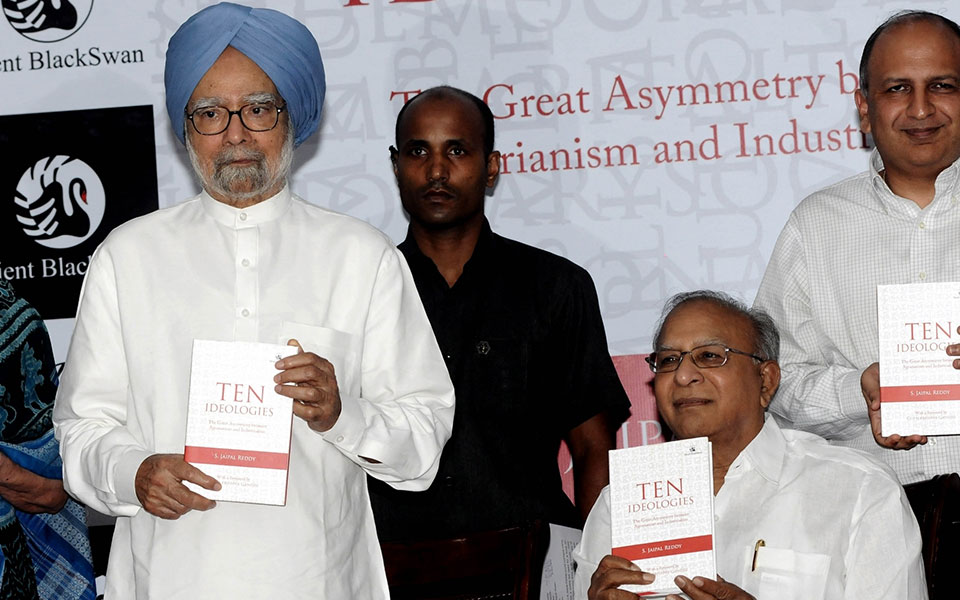New Delhi, Aug 8 : Former Prime Minister Manmohan Singh on Tuesday said that resurgence of "nativism and protectionism in the West is a disturbing trend" and the "old and tried approaches may not suffice".
"Building goodwill and peace among nations is of paramount importance," he said after releasing a book, "Ten Ideologies - The Great Asymmetry between Agrarianism and Industrialism", authored by his former Cabinet colleague S. Jaipal Reddy.
Singh said that in the process of writing the book, Reddy brings out that the "divisions based on race, religion, caste or colour are products of the historical periods, but cannot be accepted by holistic reading of history".
"While alluding to the beginnings of the Industrial Age, the author has pointed out that the historical foundations for the new era were provided by China, India and West Asia, both in ancient times and medieval period," said Singh addressing the audience at the Constitution Club of India.
"The technologies borrowed from the East helped the West in having the Renaissance, Reformation, Scientific Revolution etc. It was these intellectual movements which stimulated historical changes and new schools of thought. They were all happening at about the same time," said Singh.
Singh further said: "The resurgence of nativism and protectionism in the West is a disturbing trend. Old and tried approaches may not suffice. We should not hesitate to think afresh.
"While doing so, the paramount thing is to build goodwill and peace among nations. In this context, the conflict of mindsets of Agrarian and Industrial eras that Sri Jaipal Reddy focuses upon is relevant."
Singh also said he was reminded of his Cambridge days as he went through the book. "As I went through the book and came across the ideas of masterly thinkers, I have been reminded of my own Cambridge days.
"It is like going back to basics. I have enjoyed this refreshing experience and benefited by it. I am happy to note that Jaipal Reddy is trying to build a new approach to meet the current crises in the world. This is what we should focus on," he said.
Praising Reddy, Singh further said: "Although he has been a professional politician, he has proved to be an intellectual as well. I hope and trust that this will set a new trend in Indian politics."
Let the Truth be known. If you read VB and like VB, please be a VB Supporter and Help us deliver the Truth to one and all.
Bengaluru (PTI): The Karnataka government has issued directions to municipal corporations across the state to regulate and prohibit feeding pigeons in public places, citing serious public health concerns.
Deputy Secretary to Government V Lakshmikanth has written to the Urban Development Department requesting it to issue directions to the Greater Bengaluru Authority (GBA) and all municipal corporations to take immediate steps to implement the measures.
In an official note dated December 16 issued by the Health and Family Welfare Department and released to the media on Wednesday, the department said uncontrolled feeding of pigeons in public places has resulted in large congregations of birds, excessive droppings and serious health concerns, particularly respiratory illnesses linked to prolonged exposure to pigeon droppings and feathers such as hypersensitivity pneumonitis and other lung diseases.
ALSO READ: Chinese GPS tracker found on seagull near Karwar Coast
"The commissioner, the Greater Bengaluru Authority and the Commissioners and chief officers of other municipal corporations shall take necessary action to mitigate the causes of dangerous disease spread by pigeon and enforce specified guidelines in their respective jurisdiction," the note said.
According to the department, these include a prohibition on feeding pigeons or causing pigeons to be fed in areas where it may cause nuisance or pose a health hazard to the public. Pigeon feeding shall be permitted only in designated areas in a controlled manner, subject to certain conditions.
"The designated areas may be selected in consultation with stakeholders. The responsibility for upkeep of the designated areas and compliance to the directions shall be taken up by some charitable organisation or an NGO. The feeding in designated areas shall be permitted only for some limited hours in the day," it said.
The note further stated that authorised officers of local authorities shall issue on-the-spot warnings and may impose fines for violation of the order, or lodge complaints to prosecute offenders under Sections 271 (Negligent act likely to spread infection of disease dangerous to life) and 272 (Malignant act likely to spread infection of disease dangerous to life) of the Bharatiya Nyaya Sanhita.
It also directed local authorities to conduct public awareness campaigns, including the display of signboards, banners and digital messages, explaining the health hazards associated with pigeon droppings and feathers, the content of the regulatory directions and penalties for violations, and alternative humane methods of bird conservation that do not endanger public health.





